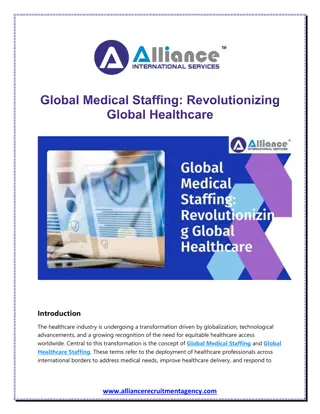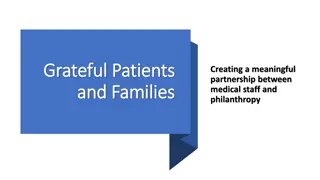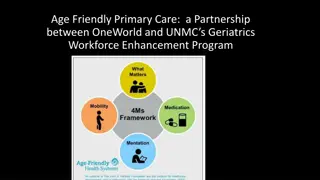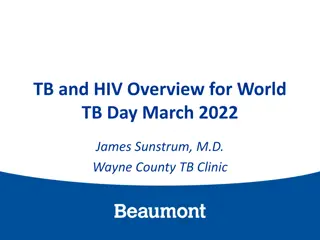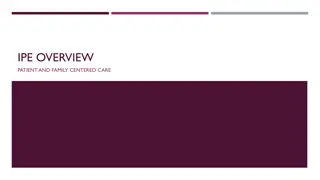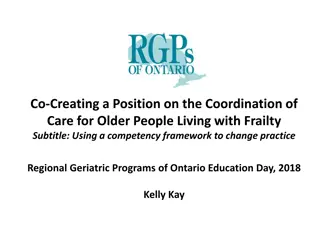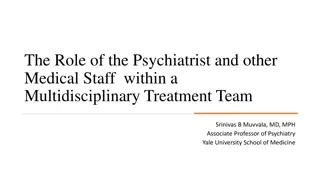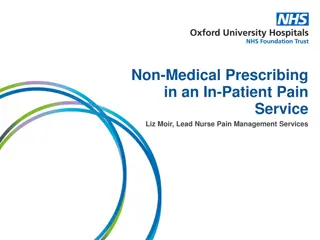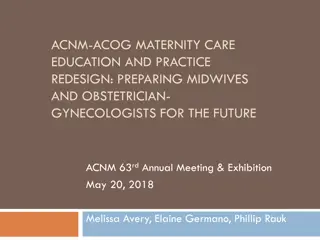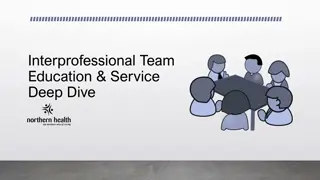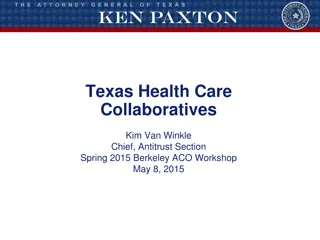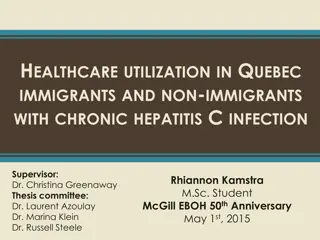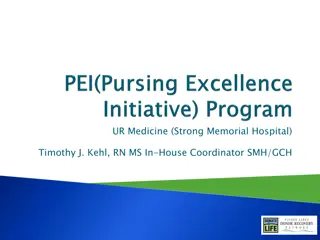Enhancing Interprofessional Collaboration in Healthcare: Insights from ICMS-2022
Collaboration and teamwork are crucial in healthcare organizations for providing the best patient outcomes. This summary discusses the importance of communication, trust, and willingness to collaborate among healthcare professionals. It also delves into the role of empowerment and effective leadership in fostering a collaborative healthcare environment. Insights from the International Conference on Management Studies (ICMS-2022) shed light on strategies to improve interprofessional collaboration in healthcare settings.
Download Presentation

Please find below an Image/Link to download the presentation.
The content on the website is provided AS IS for your information and personal use only. It may not be sold, licensed, or shared on other websites without obtaining consent from the author. Download presentation by click this link. If you encounter any issues during the download, it is possible that the publisher has removed the file from their server.
E N D
Presentation Transcript
8 8th thInternational Conference on Management Studies International Conference on Management Studies (ICMS (ICMS- -2022,) June, 10 2022,) June, 10 Naffisah Mohd Hassan Sharifah Naziha Syed Kholed Siti Noorsuriani Maon www.EUROKD.com
Authors MS SITI Naffisah Mohd Hassan Sharifah Naziha Syed Kholed NOORSURIANI MAON ICMS-2022 2
Authors Biographies Naffisah Mohd Hassan is a senior lecturer at the Faculty of Business and Management, Universiti Teknologi MARA (UiTM), Malaysia. She received her Ph.D. from the University of Wollongong, Australia. She has published papers in various journals and conference proceedings. She is an active member of community engagement projects with NGOs. She has organized a number of community projects to raise awareness, understanding, and acceptance of autism within Muslim communities. MS Sharifah Naziha Syed Kholed is a lecturer from Science Programme at Sunway College Johor Bahru. She received her Master from Universiti Teknologi MARA (UiTM) Shah Alam, Malaysia. She has participated in several research works relevant to her interest. Her research interest includes management, health behavior, and health communication. Siti Noorsuriani Maon is an associate professor at the Faculty of Business and Management, Universiti Teknologi MARA (UiTM), Malaysia. She received her PhD from the University of Queensland (UQ), Australia in 2013. She has actively participated in several research works and community projects relevant to her interest. Her research interest includes management, health behavior, health informatics, and technological intervention in health improvement. ICMS-2022 3
Introduction In collaboration requires continuous interaction, coordinated efforts, and knowledge sharing among healthcare providers. Teamwork is essential when there is a need to deal with different types of patients in a healthcare organization. The consistent collaboration between physicians and nurses daily will provide the best outcome for patients. healthcare practice, interprofessional ICMS-2022 4
The Literature Review Communication, trust, and willingness to collaborate Morris & Matthews (2014) suggested that communication can improve inter-professional collaboration among healthcare professionals and create vibrant teamwork. Similarly, Stutsky & Spence Laschinger (2014) found that trust, cooperation, communication skills, and support structures are predictors of inter-professional collaboration practice. However, it can be difficult for healthcare professionals to establish positive working relationships, particularly in terms of communication, trust, and respect (Vatn & Dahl, 2022). Interprofessional care teams are taught to necessitate a variety of collaborative qualities, such as team member trust and willingness to collaborate (Rahayu et al, 2021). ICMS-2022 5
The Literature Review Empowerment and effective leadership Empowerment has been considered a significant contributor, especially within dynamic and complex environments such as a healthcare environment (Purdy et al., 2010; Spence Laschinger et al., 2012) Hlongwa & Rispel, 2021 echoed that effective leadership in an organization plays a crucial role in the success of the organization, especially in the healthcare environment. ICMS-2022 6
The Literature Review Equal job distribution and human resource management Some evidence from research in the human resource management arena has found that fairness in an organization can lead to attitude adjustments, organization citizenship behaviors, and changes to individual or teamwork and job performance (Ocampo et al., 2018). A great deal of research conducted in hospital settings demonstrated that human resources managers created motivational processes, which motivated employees towards higher engagement (Bakker & Demerouti, 2007; Wang et al, 2021). With a validated framework, clinical professionals will become more aware of the importance of individual attitudes and behaviors and team interactions to improve patient safety and quality. ICMS-2022 7
The Literature Review Communication Respect Trust Willingness to collaborate Inter-professional collaboration Practices Empowerment Leadership Job fairness Job resources ICMS-2022 8
The Study This paper is intended to examine the relationship between collaboration practices and inter-professional teamwork that includes interactional factors (i.e. communication, trust, respect and willingness to collaborate), and organizational dimensions (i.e. leadership, empowerment, job resources and job fairness). interprofessional ICMS-2022 9
Research Hypotheses H1. There is a positive relationship between communication and interprofessional collaborative practice among physicians and nurses. H2. There is a positive relationship between trust and interprofessional collaborative practice among physicians and nurses. H3. There is a positive relationship between respect and inter-professional collaboration practice among physicians and nurses. H4. There is a positive relationship between willingness to collaborate and inter-professional collaboration practice among physicians and nurses. H5. There is a positive relationship between empowerment and interprofessional collaborative practice (IPCP) among physicians and nurses. H6. There is a positive relationship between leadership and interprofessional collaborative practice (IPCP) among physicians and nurses. H7. There is a positive relationship between fairness and inter-professional collaboration practice (IPCP) among physicians and nurses. H8. There is a positive relationship between job resources and inter- professional collaboration practice (IPCP) among physicians and nurses. ICMS-2022 10
Methodology Study design and participants A quota sampling technique was employed 200 respondents completed and returned usable questionnaires with a 1:1 ratio of physicians and nurses that were valid for data analysis. Data collection and instrument A questionnaire survey was conducted and divided into three sections: 1st section on demographic information of respondents, 2nd section measures eight constructs using 38 items. 3rd section consists of 8 items focusing on the interprofessional collaborative practice Items adapted from previous works and literature (Gaboury et al., 2011; Kenaszchuk et al., 2010; deg rd et al., 2008; Schaufeli et al., 2006). Five-point Likert scale with ratings ranging from 1 (strongly disagree) to 5 (strongly agree) was used. ICMS-2022 11
Methodology Data analysis Valid data were analyzed using IBM SPSS version 26 and SmartPLS 3.0 data analysis software. Descriptive statistics and data analysis were performed using IBM SPSS software. Using SmartPLS, the measures each construct, and the structural model evaluate the relationships among latent variables based on the hypotheses measurement model ICMS-2022 12
Results The findings revealed that communication, trust, respect, and job resources were positively associated with interprofessional collaboration practice. ICMS-2022 13
Results Demographic background No Variable n % 1 Discipline Physician 100 50 Nurses 100 50 2 Gender Male 36 18 Female 164 82 3 Ethnicity Malay 172 86 Chinese 9 4.5 Indian 3 1.5 Others 16 8 4 Working experience < 1 year 39 19.5 2-4 years 38 19 123 61.5 > 4 years 5 Marital Status Single 78 39 Married 119 59.5 Divorced 3 1.5 6 Education Level Diploma 79 39.5 Degree 96 48 Postgraduate 4 12.5 7 Collaboration Somewhat 41 20.5 Quite a lot 71 35.5 Consistently 88 44 ICMS-2022 14
Results Measurement Model Analysis Internal consistency reliability Item Convergent validity No Construct Cronbach alpha Cross loading AVE* CR* 1 Inter-professional practice collaboration (IPC) 5 0.601 0.831 0.624 0.848 0.892 2 Willing to collaborate (WC) 3 0.818 - 0.872 0.714 0.800 0.882 3 Communication (CO) 4 0.661 0.848 0.609 0.789 0.861 4 Trust (TR) 3 0.766 0.799 0.610 0.680 0.824 5 Respect (RE) 4 0.778 0.866 0.669 0.836 0.890 6 Leadership (LE) 6 0.815 0.913 0.764 0.938 0.951 7 Empowerment (EM) 5 0.674 0.908 0.689 0.884 0.916 8 Job resources (JR) 5 0.733 0.780 0.585 0.843 0.880 9 Job fairness (JF) 4 0.728 0.889 0.675 0.839 0.892 *AVE: Average Variance Extracted; CR: Composite reliability ICMS-2022 15
Results Hypothesis testing Std Beta Std. Error t- Hypothesis Relationship P Values Decision R2 VIF value Communication -> IPCP Respect -> IPCP Trust -> IPCP Willingness -> IPCP Empowerment -> IPCP Leadership -> IPCP Job fairness -> IPCP Job resources -> IPCP 2.845 H1 H2 H3 0.239 0.199 0.157 0.105 0.081 0.101 2.275 2.461 1.553 0.011 0.007 0.060 Supported Supported Not Supported 0.494 2.041 2.523 2.286 H4 0.151 0.099 1.53 0.063 Not Supported 2.332 H5 0.170 0.083 2.053 0.020 Supported 2.449 H6 0.037 0.086 0.43 0.333 Not Supported 1.638 H7 0.035 0.074 0.471 0.319 Not Supported 2.973 H8 0.188 0.102 1.843 0.033 Supported ICMS-2022 16
Discussion Improving interprofessional collaboration practice is essential to enhance the quality of care, optimize financial expenditure, and improve patients therapeutic outcomes. Physicians and nurses are the two major professions that always need each other s in provide healthcare to patients and require optimized collaboration in healthcare settings (Wallace et.al., 2021). This study revealed that it is important for physicians and nurses to produce quality solutions for patient care and job responsibilities, as per observed during the COVID-19 pandemic. Other than that, physicians and nurses from university hospitals believed that open and frequent discussions on problematic issues and concerns can improve IPCP among healthcare professionals. ICMS-2022 17
Discussion A weak relationship between trust, empowerment, leadership, and fairness has shown that there is a different style of work collaboration between physicians and nurses. In terms of dominance, the study has revealed that physicians are more dominant in making decisions compared to nurses. It has been highlighted that nurses require acknowledgment from physicians before making any decision-making regarding patient treatment (Mansoure, 2019). However, in many cases, physicians would not put their full trust in nurses because they believe that they are more experts to give treatment and have a better understanding of the patient s condition. Thus, nurses have no autonomy to make decisions and are not accepted by many physicians because physicians assume that they have greater authority and responsibility to the patient. ICMS-2022 18
Discussion The result from the current study also mentioned that there was a significant relationship between empowerment and interprofessional collaboration because physicians and nurses stated that they have different job responsibilities toward the patient According to a previous study, it has mentioned on nurses have no authority to make a decision or give treatment to patients but they are allowed to communicate about the patient s situation, then physicians are responsible for treatment purposes (Aase et al., 2016). Regarding this situation, physicians believe that nurses are only responsible to give care to patients in terms of caring as opposed to curing (Lari Mahboube, 2019). From the result of the study, fairness was found to have no relationship with interprofessional collaboration. Fairness in the health care sector is one of the factors that need to be further investigated among researchers. Fairness can affect the job performance of individuals and their collaboration with team members if they feel stressed in their working environment. ICMS-2022 19
Implications This study's findings revealed factors relating to communication, respect, empowerment, and job resources that can be worked on in the working relationship to help physicians and nurses find the best methods or strategies for delivering healthcare service to the community. ICMS-2022 20
Implications This research provides a useful starting point in investigating new factors for interprofessional teamwork and interprofessional collaborative practice in non-western countries, especially Malaysia. Thus, it is hoped that the study can contribute to the improvement of interprofessional teamwork and interprofessional among physicians and nurses in the healthcare sector in Malaysia. collaborative practice ICMS-2022 21
Suggestions for Further Research Future collaboration practice can focus on different healthcare organizations, such as private or public hospitals, including a greater variety of professions, such as pharmacists, radiologists, lab chemists, management, and others. research on interprofessional ICMS-2022 22
For Scientific Heroes www.EUROKD.com ICMS-2022 23






